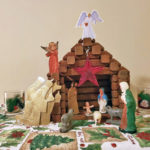
Tracey Jacobsen of the Diocese of Davenport, left, gives a participant of the Synodal Summit a name tag. The diocesan-wide event was held June 17 at St. Ambrose University in Davenport.
By Barb Arland-Fye
The Catholic Messenger
DAVENPORT — St. Ambrose University Professor Matthew Coomber, presenter for the Diocese of Davenport’s celebration of the Sunday of the Word of God, explored with participants what the Bible teaches about hospitality.

His teaching focused on the intersections that develop between Bible and culture. Hospitality is an intersection that the Davenport Diocese has been exploring over the past year as part of its emphasis on welcoming and belonging.
Professor Coomber, an Episcopalian priest, quipped that 500 years ago, Anglicans and Catholics were trying to kill each other. Now, (Jan. 21) he marveled, he was giving a talk in diocesan headquarters on hospitality and teaching at a Catholic university.
He began his talk with this caveat: The Bible is not a book; it is an anthology. “It’s a library of a collection of texts, inspired by God.” Men wrote the texts, drawing from their own cultural perspectives, and each generation receives those texts within the context of their own cultural perspectives.
Coomber said he was not letting the Bible off the hook for the many examples of inhospitality it contains. “We do find texts that are very xenophobic. But many texts are very embracing of other cultures.” An “overwhelming sense of hospitality of a welcoming nature” exist in both the Old Testament and the New Testament, he said.
Before exploring some of those texts, he asked his in-person and virtual audience at the St. Vincent Center to share words that they associate first with hospitality and then inhospitality. Themes emerged for hospitality — developing and maintaining of community, which creates bonds — and inhospitality — unrest, conflict, hatred/prejudice.
Coomber asked, “With whom are we likely to be hospitable?” The consensus: “We tend to want to be around other people who reflect us, who affirm us.” Conversely, “we are inhospitable to people who are different than us.”
Hospitality is important not because church attendance is on the decline but because “Christ’s mission depends on us being hospitable,” Coomber said. He asked what turns people off to church. Participants said people who identify as LGBTQ or who are divorced don’t feel accepted. The Church doesn’t relate well to young people. Some are turned off by what they perceive to be rigid rules and others believe the Church does not adequately address women’s roles.
Coomber raised another question: Why is it important that Christ believes in life before death? The answer; “Christ’s teachings were about how to live with the people around us.” Coomber also referenced the personal principle from the “Compendium of the Social Doctrine of the Church.”

Acknowledging and affirming the inherent dignity of each person requires a change of heart, as well as working together to bring about systemic change. It requires a commitment to use one’s time, talent and treasure. It requires receiving a person in a way that makes them feel welcomed and respected, he said.
“As Christians and as a Church we are called to live life in community with both God and also with others,” Coomber said, asking, “How is this call from God a gift?” The responses: “It allows us to experience God from a different perspective” and to “better seek those who are alone.” It is not about seeing one’s neighbor as one’s competitor.
Coomber shared texts from Scripture that speak of God serving as a host for humanity (Genesis 1:26-2:3.) and explored themes of honoring and respecting others (Leviticus 25:23). “When we are being hospitable, we are welcoming the stranger home.”
He cited biblical warnings of the failure to practice hospitality, such as the parable of the Rich man and Lazarus (16:19-31). Christ’s role as a guest speaks to the call to hospitality, Coomber said. “Christ is so fully human that he cannot be understood apartment from his role as guest, often in his homelessness. … Hospitality to the homeless Jesus becomes the gate to the kingdom.”
Hospitality also creates a sense of vulnerability, Coomber observed. “We enter into our own discomfort.” He asked the presentation’s participants to consider “How am I being a guest and how am I being a host?”
Coomber shared a quote on hospitality that resonated with him: “Hospitality toward the stranger is an intentional act and breaks through the differences. It is a demonstration of acceptance through the recognition of our common humanity” (Professor Daniel Carroll Rodas, Wheaton College).











